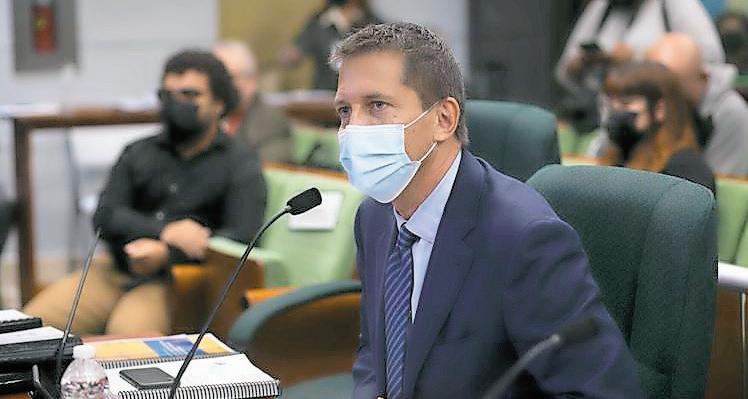
3 minute read
RefoRms
FOMB: Lack of Progress on ‘Five Critical Structural Reforms’
Represents billions in potential government revenues
Advertisement
Rosario Fajardo
rfajardo@wjournalpr.com @RosarioWJournal
With the exception of reforms in Puerto Rico’s electrical system, as envisioned in the publicprivate partnership agreement that LUMA Energy has with the Puerto Rico Electrical Power Authority (PREPA), the central government continues to lag behind in implementing “five critical structural reforms” that the Financial Oversight and Management Board (FOMB) has on its priority list.
According to the FOMB, the reforms are necessary to restore competitiveness to the island, enable growth and spur a return to prosperity in Puerto Rico. During a public meeting held last week, the Oversight Board estimated that full and timely implementation will add almost one percentage point of economic growth and $25 billion in revenues to the Puerto Rico government over the next three decades.
“Improvements to human capital and welfare to increase the qualified work force; reform of the electricity sector to ensure more affordable, more reliable, and cleaner electricity; improvement of the business environment, be it permits, registration of property, infrastructure or tax administration burden; comprehensive reform to improve the education of our children will lead to a permanent turnaround of the Puerto Rican economy, and address Puerto Rico’s chronic under-investment in infrastructure,” said Natalie Jaresko, the FOMB’s executive director.
“We have made some progress, in implementing these reforms in Puerto Rico, but we have a long way to go to complete them… “Only full implementation of these reforms will enable Puerto Rico to be competitive with the rest of the world in attracting investments and create high quality jobs that will improve the lives of all Puerto Ricans right here, in Puerto Rico,” she added. “Failure to reform is not an option.”
The largest contributors to economic growth and government revenue will be the overhaul of Puerto Rico’s energy system, adding an estimated $11 billion, and reforms making it easier to do business in Puerto Rico are estimated to add over $9 billion.
The FOMB’s Natalie Jaresko >Carlos Rivera Giusti
During the meeting, Gov. Pedro Pierluisi reaffirmed his support of the LUMA contract. “There is so much bad information out there, unnecessary politicization, against LUMA and it is shocking. Everybody wants to criticize the contract. It should be remembered that PREPA’s response after Hurricane Maria was disastrous,” Pierluisi said.
The governor added that the lack of professionalization at PREPA is clear, which is why “we need professional management of the transmission and distribution system… Puerto Rico is a place of law and order, the government has to honor its contracts and this one in particular went through a process with the Public-Private Partnerships Authority, PREPA and the FOMB,” he said.
The Five Critical Structural Reforms are:
•Human Capital and Welfare: The Puerto Rico Treasury Department successfully updated tax forms and enabled regulations and legal changes necessary to implement the earned income tax credit (EITC), but few efforts have been made to communicate and educate the target population. On the EITC front, of the estimated $240 million in credits that the government could have granted, only $115 million were claimed by taxpayers. On the Nutrition Assistance Program, the Administration for Socioeconomic Development of the Family delayed implementation of the work/ volunteer requirement and has not finalized a detailed implementation plan. •Ease of Doing Business: The Department of Economic Development and Commerce has made initial progress in reforming the process to obtain permits and the Department of Justice has made some progress in reducing the property registration backlog. Invest Puerto Rico and Discover Puerto Rico have made great progress in their mission to help grow Puerto Rico’s economy. However, a tax administration reform necessary to improve Puerto Rico’s competitiveness is delayed. •Education Reform: The Department of Education and the University of Puerto Rico have made progress in the implementation of their tutoring program for low-performing schools and in supporting teachers during remote teaching in the pandemic. However, the department lacks a comprehensive strategy to leverage researchbacked practices to increase family engagement and a plan to support data-driven decision making. •Power Sector: The transformation of the Puerto Rico energy sector already reached several milestones on its path to provide households and businesses with more reliable, more affordable, and cleaner energy. Puerto Rico now has a truly independent energy regulator, and PREPA’s grid will soon be managed by a private operator, LUMA Energy. LUMA is incentivized to improve reliability and customer service, make investments, and create efficiencies that will help making electricity more affordable. The Public-Private Partnerships Authority has commenced a process to select one or more professional, private operators to manage PREPA’s generation. •Infrastructure: Progress has been made to increase capital investments in transportation assets but developing a prioritization framework for transportation sector investments remains behind schedule.




